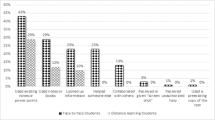Abstract
Accounting educators are in the midst of creating new opportunities for students to enhance their abilities to recognize ethical dilemmas, establish criteria by which to make ethical decisions, and establish support mechanisms and strategies to facilitate their ethical decision-making. CPA firms, professional organizations and state boards of accountancy are co-operating to increase requirements for ethics education for candidates taking the CPA exam. The current situation is confusing and sub-optimal regarding the use of precious learning time in college programs. A new dialogue between the three stakeholders, creative learning approaches, and additional resources can lead to a more consistent and optimal learning paradigm regarding the ethics education of accountants. Research evaluating the effectiveness of various approaches is needed to effectively apply limited resources in an area critical to the reputation capital of the accounting profession.
Similar content being viewed by others
References
Accounting Education Change Commission: 1990, Position Statement No. 1: Objectives of Education for Accountants, American Accounting Association
Clarke P., Thorley N., Stevens K. (1996). Ethical Reasoning Abilities: Accountancy Practitioners in Ireland. IBAR-Irish Business and Administrative Research 17: 94– 109
Eynon G. et al. (1997). Factors that Influence the Moral Reasoning Abilities of Accountants: Implications for Universities and the Profession. Journal of Business Ethics 16: 1297–1309
Fuerman R.D. (2004). Accountable Accountants. Critical Perspectives on Accounting 15: 911–926
Gainen J. et al. (1995). Assessment for the New Curriculum: A Guide for Professional Accounting Programs. American Accounting Association, Sarasota, FL
Giacalone R. A., Jurkiewicz C. L. (2003). Right from Wrong: The Influence of Spirituality on Perceptions of Unethical Business Activities. Journal of Business Ethics 46: 85–97
Green S., Weber J. (1997). Influencing Ethical Development: Exposing Students to the AICPA Code of Conduct. Journal of Business Ethics 16: 777–790
Koehn D. (2005). Integrity as a Business Asset. Journal of Business Ethics 58: 125– 136
Kohlberg L. (1969). Stage and Sequence: The Cognitive-Developmental Approach to Socialization. In: Coslin D.A., (ed) Handbook of Socialization Theory and Research. Chicago, Rand McNally
Ponemon L. (1992). Ethical Reasoning and Selection-Socialization in Accounting. Accounting Organizations and Society 17: 239–258
Public Accounting Report, November 30, 2005, CCH Inc
Romal J. B. et al. (2004). Improving Professional Ethics: Steps for Implementing Change. The CPA Journal 5: 58–60
Rosanas J. M., Velilla M. (2005). The Ethics of Management Control Systems: Developing Technical and Moral Values. Journal of Business Ethics 57: 83–96
Tsui J. S. L., Windsor C. (2001). Some Cross-Cultural Evidence on Ethical Reasoning. Journal of Business Ethics 31: 141–150
Venezia C. C. (2005). The Ethical Reasoning Abilities of Accounting Students. The Journal of American Academy of Business 3: 200–207
Author information
Authors and Affiliations
Corresponding author
Additional information
Kevin holds a B.B.A. from Western Michigan University and a Ph.D. from Michigan State University, along with being a CPA. He has been at Notre Dame since 1978, and served as the first Arthur Young Faculty Fellow in Taxation from 1983 to 1985. From August 1985, to June 1986, Kevin worked as a faculty resident in the Arthur Andersen & Company practice office in Chicago. He was Assistant Department Chair from 1991 to 1995 and the University Ombudsperson for discriminatory harassment from 1999 to 2001. In 1997, he organized and chaired a national conference “What Works Well in Accounting Education” held at Notre Dame. He taught in the London Program for the fall, 1998 semester. Kevin was the Faculty Director of the Master of Nonprofit Administration Program from 2001 to 2005.
He teaches accounting courses – primarily tax courses. Recently Kevin has developed new elective courses at the undergraduate and graduate levels on “Ethics in Accounting.”
His publications include articles in The Accounting Review, TAXES - The Tax Magazine, The CPA Journal, The Review of Taxation of Individuals, Tax Ideas, Massachusetts CPA Review, The Journal of the American Taxation Association, New Accountant, the Journal of Accounting Education, Taxation for Accountants, and The Tax Adviser. He also was co-author of a Bureau of National Affairs tax management portfolio on Cash and Accrual Methods of Accounting and the book Programmed Guide to Tax Research. He is on the Editorial Review Board of Issues in Accounting Education. An article he authored on “The Normative Impact of CPA Firms, Professional Organizations and State Boards on Accounting Ethics Education” will be published in the Journal of Business Ethics in summer, 2006.
In 1989, he and his wife, Kathy, were given the Grenville Clark Award by the University for “Voluntary activities serving to advance the causes of peace and human rights.” Kevin and his wife, Kathy, have eight children, four of whom are adopted special needs children. Kevin and Kathy have been leaders in Worldwide Marriage Encounter ministry for many years.
Rights and permissions
About this article
Cite this article
Misiewicz, K. The Normative Impact of CPA Firms, Professional Organizations, and State Boards on Accounting Ethics Education. J Bus Ethics 70, 15–21 (2007). https://doi.org/10.1007/s10551-006-9082-9
Published:
Issue Date:
DOI: https://doi.org/10.1007/s10551-006-9082-9



